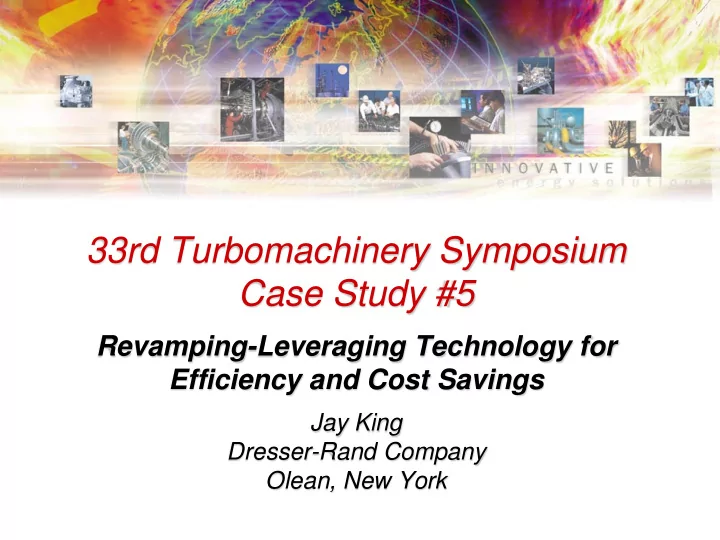

33rd Turbomachinery Symposium Case Study #5 Revamping-Leveraging Technology for Efficiency and Cost Savings Jay King Dresser-Rand Company Olean, New York
Presentation Agenda Case Study-Revamp Project(s): Gas Transmission-Operating Range/Installed Cost Computational Fluid Dynamics Stage Performance-Component Matching Ethylene Production-Capacity via Efficiency Flowpath/Stage Design Lessons Learned
Evolution of Industry Centrifugal Compressor Efficiency Today’s Technology 90 88 86 η 82 85 80 polytropic 80 78 75 75 1950 1960 1970 1980 1990 2000
“ Typical” Efficiency Improvement Revamp to Today’s Operating Point Increased Capacity and Efficiency Note : Today’s efficiency based on off-design point operation and as-sold efficiency of 75 % 83% 15% Potential curve 68% η As-sold curve Q/N
Case #1-Efficiency for Energy Savings Today’s Technology Fully machined flowpath 2 piece Welded Impeller Efficiency Improvement From 84% to 87.5% Performance Map Wider operating range DRIVER: Cost avoidance to install new Unit Piping/Foundation Changes.
Improved Flow Path Design Computational Fluid Dynamics (CFD) Improved flow distribution Optimized stage component matching All stage components operating with minimum losses (i.e. IGV, impeller, diffuser, return channel) Application of low solidity diffusers (LSD’s) Repeated performance testing to validate and refine
CFD Study of Pipeline Compressor Volute CFD Modeling: Coupling the inlet with the impeller and the LSD CFD Grids: Collector and Volute
CFD Study of Pipeline Compressor Volute CFD Qualitative Results: Velocity vector plot in the collector (left) and volute (right) cross section at design point Right LSD and bend geometry is critical to let the flow into the collector without separation Losses in this region are relatively low because of low velocity values
Stage Performance The Past Today Traditional Line-Ups: • Large gaps between standard impellers available • Use of inlet guide vanes to complete the coverage map Today’s Technology: • Elimination of flow inlet guide vanes • Many more impellers available for selection • Designed to match “Best Efficiency Point”. • Better stage-to-stage match for peak performance
PTC-10 Factory Test Results 0.95 0.9 0.85 TODAY'S 0.8 SOLUTION µ η 0.75 0.7 0.65 0.6 ORIGINAL 0.55 DESIGN 0.5 0.45 0.4 0.35 0.3 60% 65% 70% 75% 80% 85% 90% 95% 100% 105% 110% 115% 120% 125% 130% 135% 140% 145% 150% Percent Flow
Case #2-Efficiency for Production 2 sidestreams 10% flow increase for « same » pow er/energy Ethylene Cracker Compressor fitted with Today’ Technology Debottleneck/Capacity-Zero effect to Energy Cost
Riveted, Cast & Welded Impellers • Simple circular-arc blade design • Blade forms are bent in a die and riveted or welded to the disc. • Very difficult to hold tight tolerances • Rotating stall problems with parallel disc and cover design “Z” Blade Rivet Thru Blade Rivet 3-Piece Welded or Cast
Leading Edge Technology- Welded Impellers Highlights All 3/5-axis milled 2/3 piece Construction Welded Construction High fatigue strength Predictable Performance New Materials
Stationary Flowpath Design Precision machined compressor internals Smooth surface finishes reduce frictional losses. Manufacturing Technology Complicated geometry machined with greater accuracy Consistent and repeatable performance
Test Results
Lessons Learned Technology driven Performance Significant benefit form New Equipment-R&D Today’s Tools can be universally applied. Cost and Energy Savings-Economics Evaluate “Total” Installed Cost Energy reduction-Payback Production via Efficiency Revamping-A cost effective means to leverage “Today’s” Technology with “Yesterday” equipment assets.
When to Revamp... Changes in operating conditions Gas composition/molecular weight Capacity Temperatures Pressures As a means to: Reduce your Energy Consumption Increase your Productivity Reclaim lost Efficiency from Off-Peak Operation Reduce Capital Investment-New Equipment and Installation Revamping-A cost effective means to leverage “Today’s” Technology with “Yesterday” equipment assets.
33rd Turbomachinery Symposium Case Study #5 Revamping-Leveraging Technology for Efficiency and Cost Savings Jay King Dresser-Rand Company Olean, New York
Recommend
More recommend